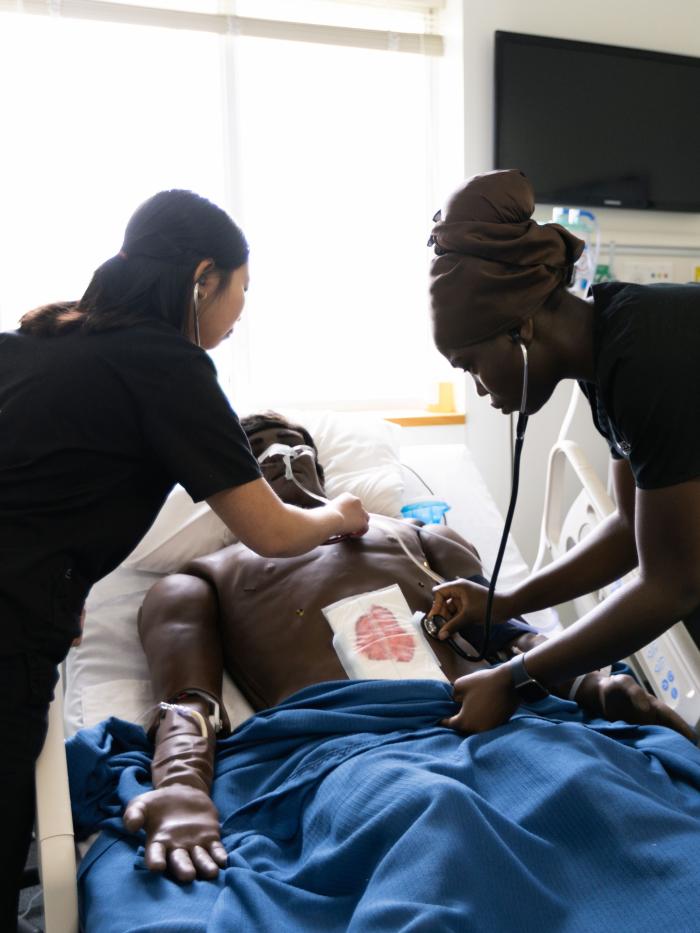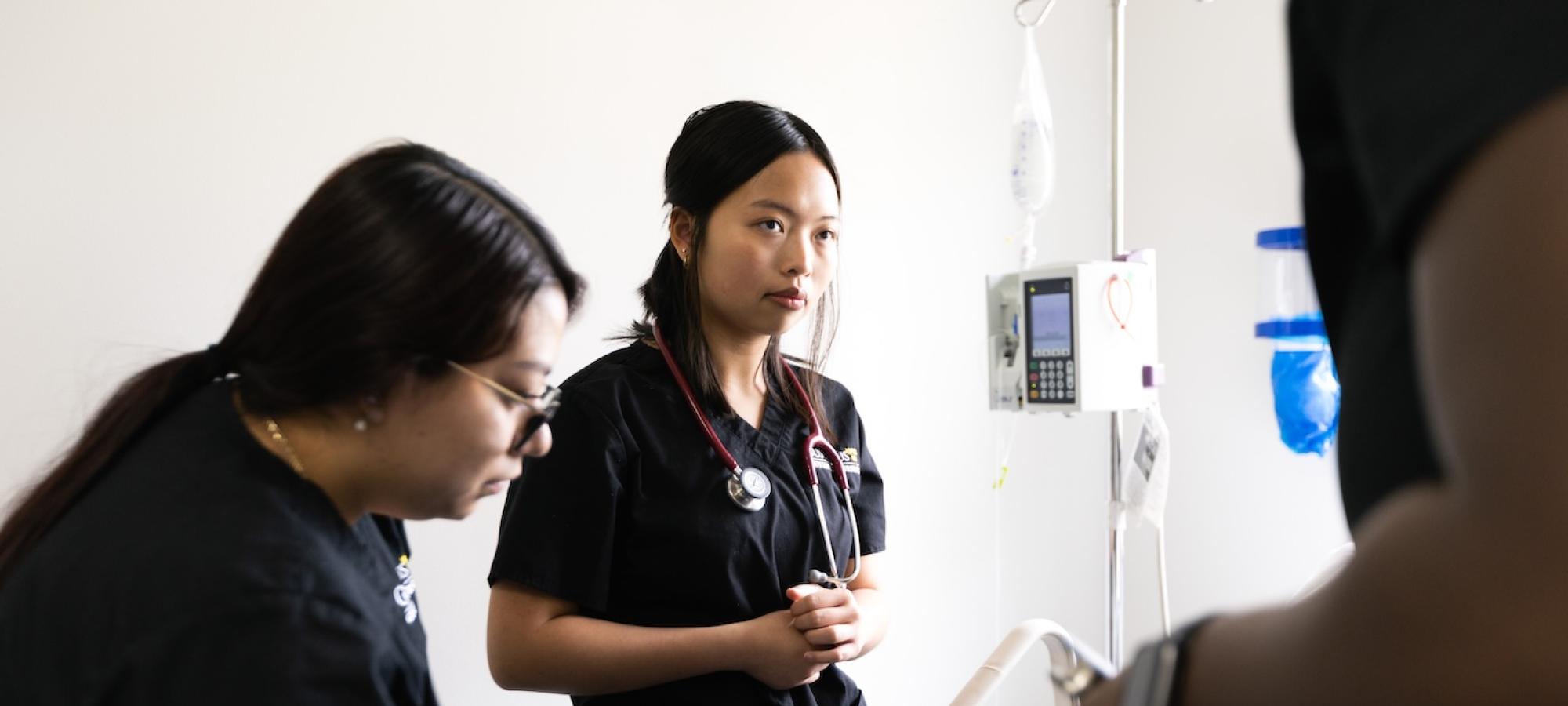
Nursing at Gustavus
Gustavus Adolphus College offers a Bachelor of Science in Nursing (BSN) degree. The Gustavus Nursing curriculum provides a broad understanding of the discipline of nursing as a way of looking at the world. As important members of interprofessional health care teams, Gustavus nurses see human needs manifested in diverse beliefs, values, resources, and conditions that impact the effectiveness of highly sophisticated technical skills, devices, and treatments. Throughout our Nursing curriculum, you will develop clinical reasoning and critical thinking skills necessary to assess, respond to, and evaluate factors that impact health and wellbeing. You'll also have the opportunity to practice interprofessional communication and collaboration skills, actively participate in the creation of knowledge by engaging in research, examine human issues that impact wellbeing, and advocate for quality, safe, and effective care for patients across the human lifespan.
Upon graduation, you'll be eligible to apply for initial licensure by examination for registered nurses offered by the National Council of State Boards of Nursing and, upon licensure, can apply for certification as a public health nurse in Minnesota.
Overview and Course Planning
Our Bachelor of Science in Nursing (BSN) curriculum is designed to help you progress in the major from simple to complex. Therefore, it is essential for students to pass the Nursing courses in the order of progression that we have established to ensure student success. See this overview of what you'll learn in each of your four years in the Nursing Program.
Learn more of the details about the prerequisites for the Bachelor of Science in Nursing (BSN) Program and see a sample plan for which courses you'll take along the way.
Bachelor of Science in Nursing (BSN) curriculum is designed for students to progress in the major from simple to complex. For example, the curriculum begins with courses that will focus on basic nursing assessment skills, become familiar with the nursing process and scope of practice, and have clinical experiences that focus on the health variance of one patient. Students will progress in the major to eventually care for multiple patients, with multiple complexities. The definition of patient will progress from the individual patient in an acute care setting to “community” (world) as the patient. Therefore, it is essential for students to pass the nursing courses in the order of progression that has been established.
First Year and Sophomore Year
The first two years at Gustavus provide a foundation in the liberal arts. In addition, students complete nursing prerequisite courses to prepare them for entry into the Nursing program. All students interested in nursing are invited to seek advising assistance from the nursing faculty. Students should consult with the Nursing Department Chair or the Program Coordinator as soon as possible to express an interest in the completion of a nursing major. Enrollment in the program is limited and admission is competitive; therefore, early consultation, preferably in the First Year, is recommended.
Junior Year
Nursing courses begin in the fall of junior year. Nursing courses during the first and second semester of the program emphasize health assessment and fundamental nursing skills. Clinical learning experiences occur with patients in acute care settings, particularly medical-surgical areas. Students are strongly encouraged to complete the co-requisite nursing course Research and Ethics in the Health Sciences during their junior year.
Senior Year
During the fall semester, students engage in classroom and clinical experiences related to specialty areas of nursing: public health, pediatrics, and maternal newborn. Courses and clinical learning experiences in the spring semester focus on psychiatric nursing, advanced medical surgical nursing, and transitioning into professional nursing practice. In addition to caring for patients in clinical learning experiences and critical care simulations, students are able to develop their leadership and management skills as well as strengthen their research abilities.
Option #1: Sample Plan of Study - View courses
Option #2: Sample Plan of Study Abroad - View courses
View the Academic Course Catalog to see the prerequisite and major courses.
Application and Admission to the Nursing Major
Please email g-nursing-chair [at] gustavus.edu (nursing-chair[at]gustavus[dot]edu) to contact the chair and nursing program coordinator.
Students are welcome to consult the Nursing Department Chair for assistance in selecting courses pre-requisite to the nursing major.
Learn more about the application and process for admission to the Nursing program.
The Nursing major begins in the fall semester of the junior year. The Nursing Department offers two pathways for admission to the program.
Direct Entry Pathway - provides an opportunity for admission to the nursing major for first-year students (entering directly from high school) who meet and maintain the Direct Entry criteria
Holistic Admission Pathway - For current Gustavus student who did not use the Direct Entry Pathway when they started at Gustavus.
Students should consult with the Nursing Department Chair or the Nursing Program Coordinator as soon as possible to express an interest in the completion of a nursing major. Enrollment in the program is limited and admission is competitive; therefore, early consultation, preferably in the first year, is recommended.
Gustavus Adolphus College is private liberal arts college grounded in Swedish and Lutheran heritages. The college is affiliated with the Evangelical Lutheran Church in America. The college is guided by five core values: community, excellence, faith, justice, and service. Gustavus Adolphus College has offered the baccalaureate nursing program since 1956.
In the early nursing program at Gustavus, nursing students spent their first two years at Gustavus on campus and their last two years in residency at Bethesda Lutheran hospital in St. Paul. By 1986, enrollment in nursing programs across the country had declined. While several programs closed, St. Catherine University (previously known as the College of St. Catherine), Gustavus Adolphus College, and St. Olaf College combined their nursing programs to create the Minnesota Intercollegiate Nursing Consortium (MINC). The MINC office was housed at the College of St. Catherine and nursing students from all three colleges took all of their nursing classes on the campus of the College of St. Catherine.
In 1991, the College of St. Catherine withdrew from the MINC in order to expand their own program. The MINC office was moved to St. Olaf College and students from Gustavus and St. Olaf returned to their own respective colleges for classes. This was the first time in the history of the Gustavus nursing program that nursing students lived on campus all four years.
Due to growing enrollment and institutional differences, the MINC Administrative Board voted to dissolve the MINC in April, 2014. The Board of Trustees of Gustavus Adolphus College gave formal approval to the establishment of the Gustavus Nursing program in April 2014.
The Gustavus Nursing program provides an innovative, strong curriculum based on professional standards, promotes the role of nursing in a dynamic, inter-professional health care environment, and attracts diverse, well-qualified students capable of attaining expected student learning outcomes.
The Minnesota Board of Nursing granted continuous approval for the Gustavus Nursing program in June 2014.
The Department of Nursing fosters the development of nursing professionals who demonstrate the values of excellence, community, justice, service, and faith through cognitive practice, integration of learning, ethical reflection and intercultural understanding.
Graduates of the program are distinguished by:
- Synthesis and application of a liberal arts education to provide holistic, patient-centered, and high-quality care;
- Ethical and reflective practice to promote a just and peaceful world;
- The ability to advocate for the health and wellbeing of all people; and
- A commitment to lifelong learning, leadership, and service to others.
The Department of Nursing shares in the Mission of the College through an innovative and dynamic education that embraces the highest standards of teaching and scholarship.
A student who completes the Gustavus Adolphus College Nursing program will be able to:
- Integrate the liberal arts and sciences as the foundation of professional nursing practice. (AACN Essentials Domain 1)
- Provide inclusive, holistic, person-centered care. (AACN Essentials Domain 2)
- Perform clinical prevention and disease management interventions using a population health focus to improve equitable population health outcomes. (AACN Essentials Domain 3)
- Generate, synthesize, translate, apply, and disseminate nursing knowledge to improve health and transform health care. (AACN Essentials Domain 4)
- Apply quality improvement principles to promote a culture of safety. (AACN Essentials Domain 5)
- Engage in intentional interprofessional collaboration to enhance patient health outcomes. (AACN Essentials Domain 6)
- Coordinate resources to provide safe, quality, equitable care to diverse populations within complex systems of health care. (AACN Essentials Domain 7)
- Employ informatics and healthcare technologies to perform high-quality professional nursing practice. (AACN Essentials Domain 8)
- Demonstrate professionalism in nursing. (AACN Essentials Domain 9)
- Demonstrate a commitment to lifelong learning, professional growth, leadership, and well being. (AACN Essentials Domain 10)
